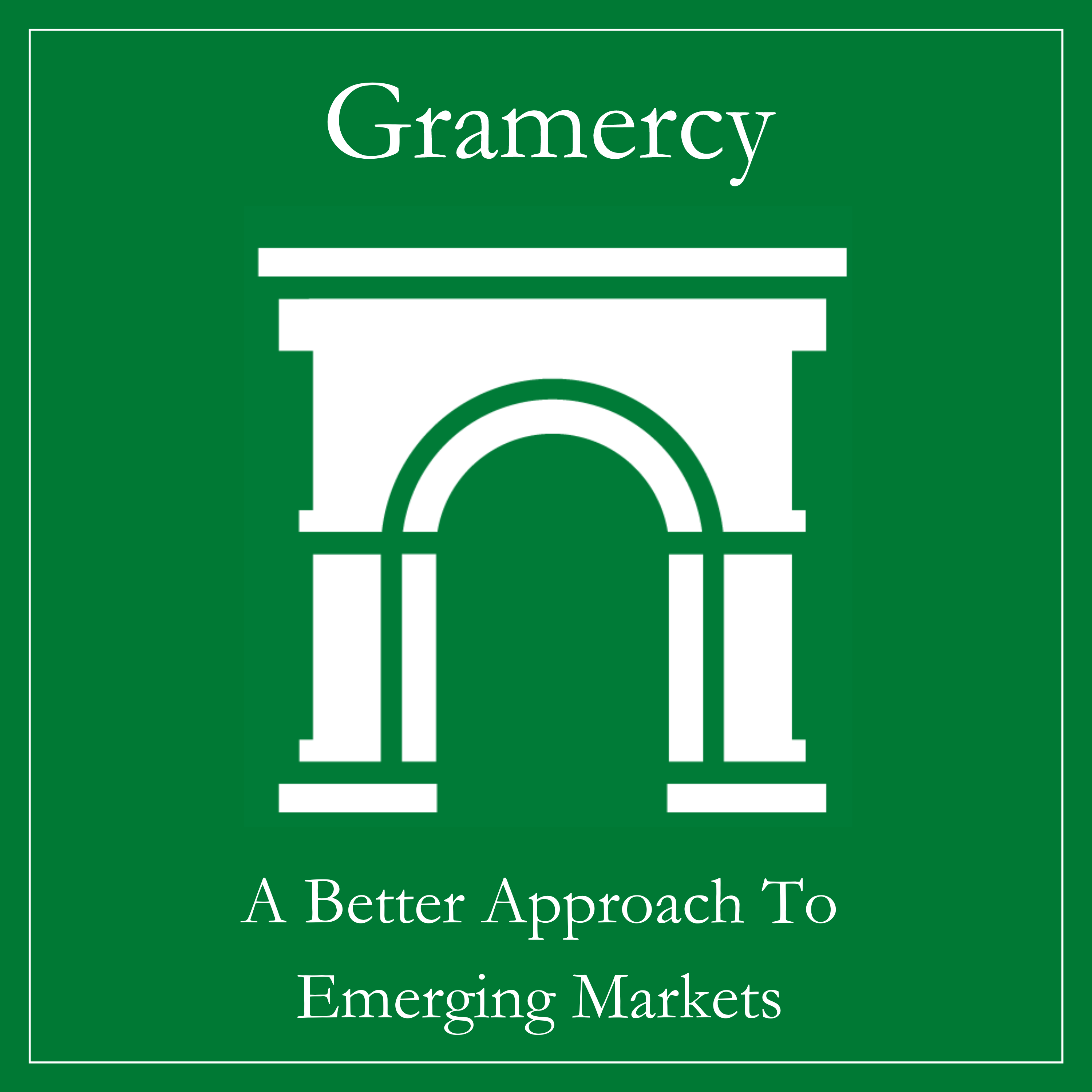Contents
Market Overview
Macro Review
The ECB cut interest rates by 25bps for the second time to 3.50%. The commentary was focused on Schnabel’s recent remarks that top side risks to inflation were evident, which was also captured in the ECB’s upward inflation revision. Nevertheless, the expected pace of the easing cycle in Europe is beginning to follow what the market has priced-in for the U.S. The Fed’s blackout period limited any further debate of whether the easing cycle would begin with a 25bps or 50bps cut until Bill Dudley and the Wall Street Journal chimed in. Importantly, U.S. headline CPI was 0.19% m/m and +2.5% y/y, meaning it was the lowest annual inflation rate since February 2021. The aftermath of the first U.S. Presidential debate saw the Mexican peso outperform, even with the looming judicial reform. The OPEC+ decision to delay its supply hikes by two months had little impact. Instead, the volatility in crude oil became more of a concern. A potential ceasefire in the Middle East also failed to materialize. The EU decided to lower the proposed tariffs on Tesla and EVs from China, which initially helped sentiment (Tesla’s tariff would decline from 9% to 7.8%). Although, more focus was on the Fed’s Basel III endgame proposal, which will see G-SIBs CET1 requirement increase to 9% and not 19% as initially sought. This was somewhat overshadowed by JPM stating they would face NIM deterioration in 2025. Elsewhere, Turkey was upgraded to BB- by Fitch when it was previously Single B, which is the first Double B upgrade by any rating agency since 2018. The market hardly cherished this moment and also ignored Jordan’s upgrade to Double B by S&P.
EM Credit Update
Emerging market sovereign credit (cash bonds) ended the week up 0.2%, with credit spreads unchanged. Sovereign outperformers were Sri Lanka, Argentina and Namibia, while Ethiopia, Gabon and El Salvador underperformed. The volatility in the Sri Lankan bond curve was notable ahead of elections on September 21st. However, the best performing sovereign was actually the Maldives. This small sovereign bond is not in the EMBI, but there have been concerns over FX reserves and an ability to pay the upcoming coupon in October. The country is at risk of becoming the first sukuk sovereign default.
The Week Ahead
The most important market event next week is the Federal Reserve decision. This will be closely followed by the Bank of Japan and Bank of England rate decisions. Chinese data across industrial production, investment and retail sales are likely to show signs of slowing next week. However, the PBoC are unlikely to move the one-year Medium Lending Facility or one-year and five-year Loan Prime Rates. Other than G10 interest rate decisions, the most important EM central bank decision is Brazil. The BCB are at risk of hiking interest rates, ending the recent easing cycle to temper inflation. The sell-side has recently begun to forecast three 25bps consecutive interest rate hikes this year. However, Central Banks in Indonesia and Turkey are likely to remain unchanged, but South Africa may cut 25bps. Given the focus on crude oil volatility, the fiscal break evens are back in focus. We can expect some focus on Azerbaijan’s oil break even at $77/bbl, although the Formula One in Baku may overshadow that temporarily.
Highlights from emerging markets discussed below: Milei’s veto of pension bill sustained, keeping fiscal costs down; inflation higher than expected and Last poll before Sri Lanka’s Presidential elections points to a tight race and a good probability that a negative outcome for markets will be avoided.
Fixed Income
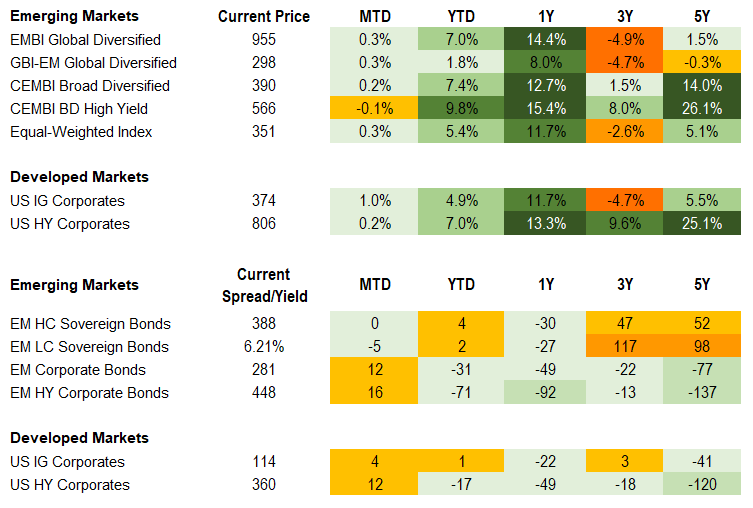
Equities
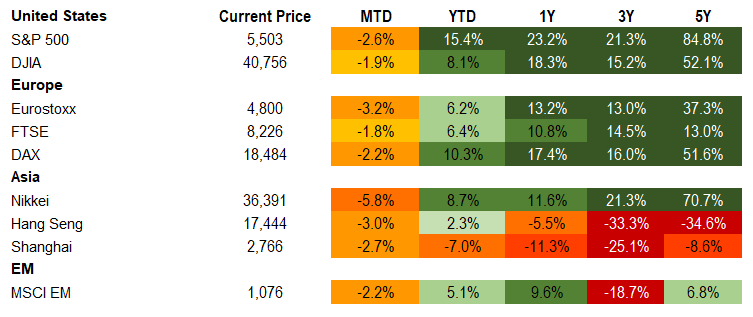
Commodities

Source for data tables: Bloomberg, JPMorgan, Gramercy. EM Fixed Income is represented by the following JPMorgan Indicies: EMBI Global, GBI-EM Global Diversified, CEMBI Broad Diversified and CEMBI Broad High Yield. DM Fixed Income is represented by the JPMorgan JULI Total Return Index and Domestic High Yield Index. Fixed Income, Equity and Commodity data is as of September 13, 2024 (early-morning).
Emerging Markets Weekly Highlights
Milei’s veto of pension bill sustained, keeping fiscal costs down; inflation higher than expected
Event: The Lower House did not secure two thirds majority to overturn President Milei’s veto of a pension bill that would increase costs. Moderate protests occurred outside of Congress in relation to the issue. Meanwhile, August inflation inched up in sequential terms to 4.2% m/m from 4.0% m/m on regulated prices, transportation, utilities and food and beverages. On an annual basis, inflation eased moderately to 236.7% y/y from 263.4% y/y.
Gramercy Commentary: Milei’s legislative victory is constructive for the primary balance and fiscal consolidation efforts. However, governability is still likely to remain challenging and contentious. The focus will be on Milei’s presentation of the 2025 budget to Congress on Sunday. The slightly hotter than anticipated inflation print reflects limitations to the Administration’s approach to monetary and FX policies, although reduction of the PAIS tax is expected to help the print next month.
Last poll before Sri Lanka’s Presidential elections points to a tight race and a good probability that a negative outcome for markets will be avoided
Event: The Institute of Health Policy’s (IHP) latest opinion poll ahead of Sri Lanka’s Presidential elections on September 21st showed that Anura Kumara Dissanayake (AKD), remains the frontrunner, but his voting intentions have slipped to 36% in August, down from 37% in July. AKD is a non-establishment left-of-center candidate whose comments about plans to “renegotiate” the country’s IMF program and “prepare an alternative Debt Sustainability Analysis (DSA)” have spooked markets in recent weeks. Meanwhile, mainstream opposition candidate, Sajith Premadasa, lost four points in the poll, bringing him to 32% vs 36% in July. The current President and IMF program champion, Ranil Wickremesinghe, remains in third place, but his voting intention has spiked to 28%, an impressive five point gain from 23% in last month’s survey.
Gramercy Commentary: The key takeaway from a market perspective is that none of the three leading candidates is likely to win more than 50% of the vote. In Sri Lanka’s Presidential election system this means that the election commission will count the second and third preferences (voters are asked to rank the candidates according to their preferred order) and only the preferences of voters who did not select the first two candidates as their top choice will be considered. As such, even if AKD wins the most votes but does not cross the 50% mark, it is quite unlikely that supporters of the other two leading candidates would have ranked him as their second preference. This peculiarity of the election system favors one of the two mainstream candidates, opposition leader Premadasa or incumbent President Wickremesinghe. Failure by AKD to win Sri Lanka’s Presidency will be a market-friendly outcome, which will likely drive a prompt recovery in the sovereign bond complex on the prospects of a quicker debt restructuring completion and an improving macro framework under the current IMF program.
Emerging Markets Technicals
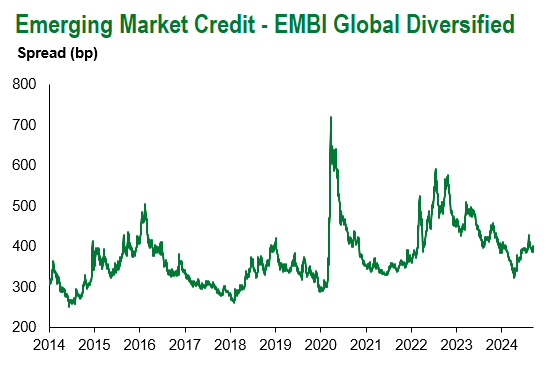
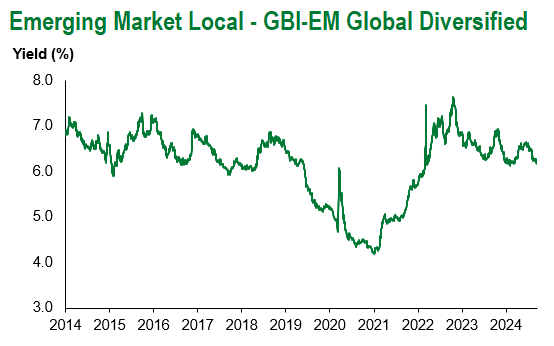
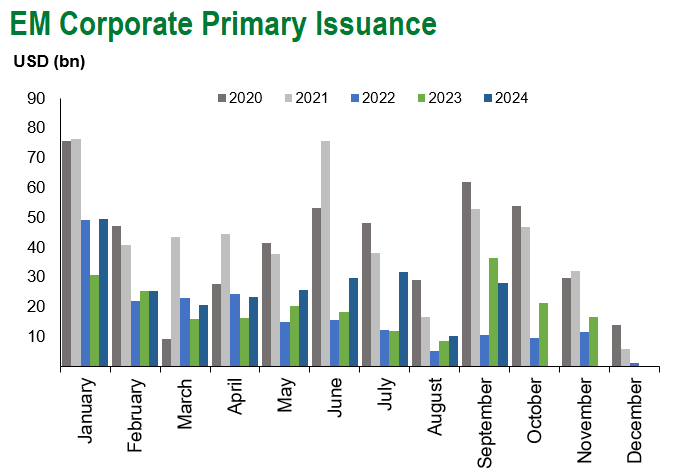
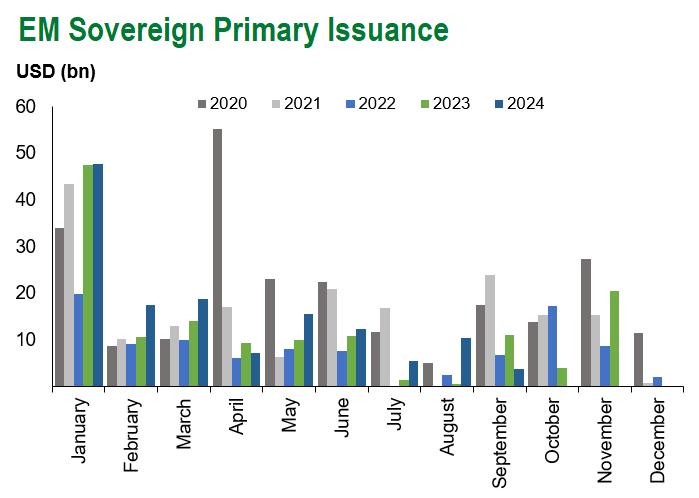
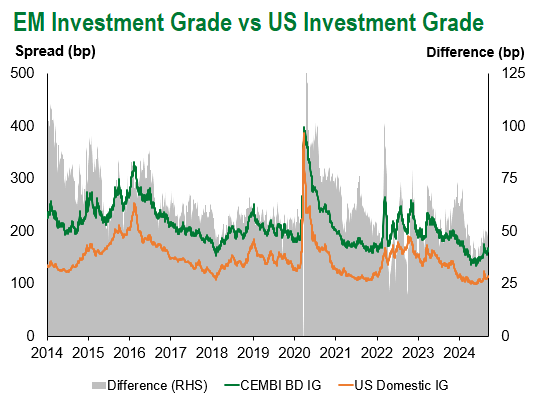
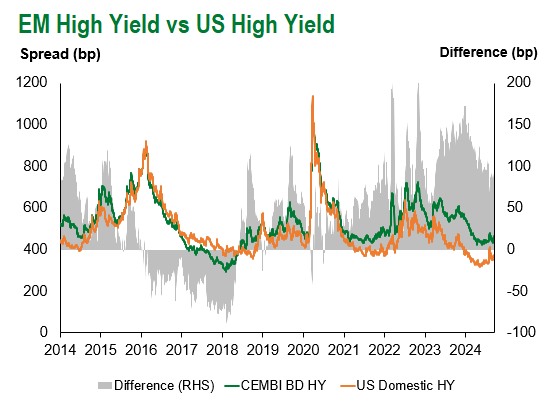
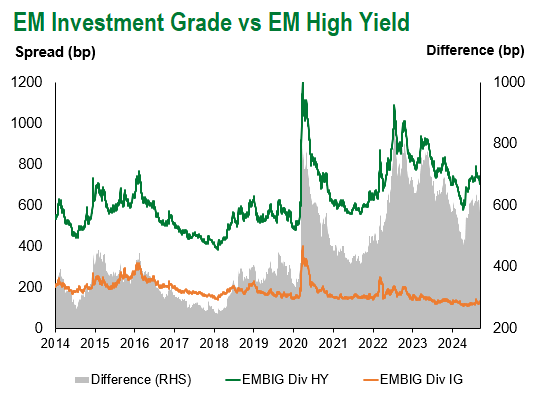
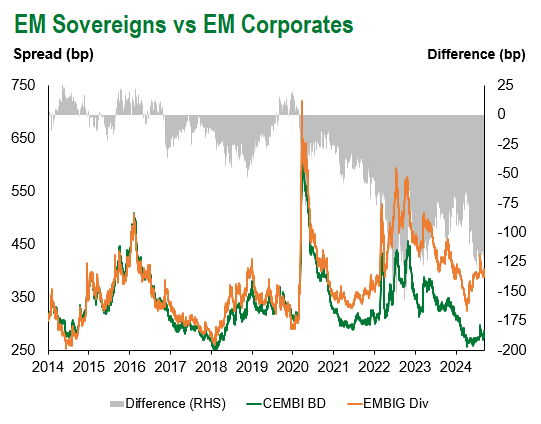
Emerging Markets Flows
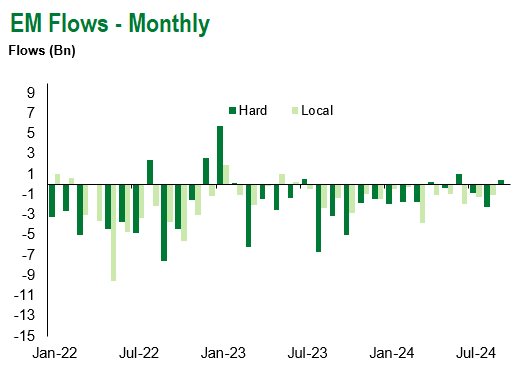
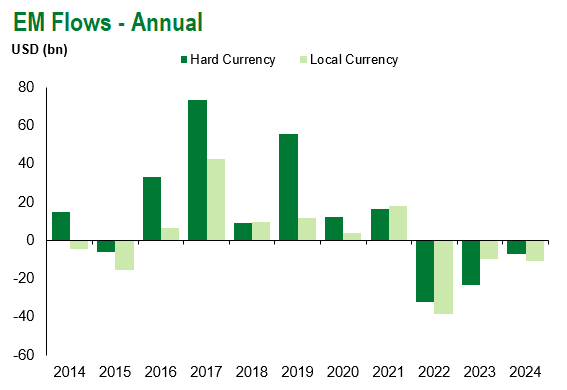
Source for graphs: Bloomberg, JPMorgan, Gramercy. As of September 13, 2024.
For questions, please contact:
Kathryn Exum, CFA ESG, Director, Co-Head of Sovereign Research, [email protected]
Petar Atanasov, Director, Co-Head of Sovereign Research, [email protected]
James Barry, Director, Deputy Portfolio Manager, [email protected]
This document is for informational purposes only. The information presented is not intended to be relied upon as a forecast, research or investment advice, and is not a recommendation, offer or solicitation to buy or sell any securities or to adopt any investment strategy. Gramercy may have current investment positions in the securities or sovereigns mentioned above. The information and opinions contained in this paper are as of the date of initial publication, derived from proprietary and nonproprietary sources deemed by Gramercy to be reliable, are not necessarily all-inclusive and are not guaranteed as to accuracy. This paper may contain “forward-looking” information that is not purely historical in nature. Such information may include, among other things, projections and forecasts. There is no guarantee that any forecasts made will come to pass. Reliance upon information in this paper is at the sole discretion of the reader. You should not rely on this presentation as the basis upon which to make an investment decision. Investment involves risk. There can be no assurance that investment objectives will be achieved. Investors must be prepared to bear the risk of a total loss of their investment. These risks are often heightened for investments in emerging/developing markets or smaller capital markets. International investing involves risks, including risks related to foreign currency, limited liquidity, less government regulation, and the possibility of substantial volatility due to adverse political, economic or other developments. References to any indices are for informational and general comparative purposes only. The performance data of various indices mentioned in this update are updated and released on a periodic basis before finalization. The performance data of various indices presented herein was current as of the date of the presentation. Please refer to data returns of the separate indices if you desire additional or updated information. Indices are unmanaged, and their performance results do not reflect the impact of fees, expenses, or taxes that may be incurred through an investment with Gramercy. Returns for indices assume dividend reinvestment. An investment cannot be made directly in an index. Accordingly, comparing results shown to those of such indices may be of limited use. The information provided herein is neither tax nor legal advice. Investors should speak to their tax professional for specific information regarding their tax situation.
